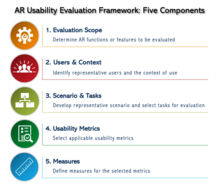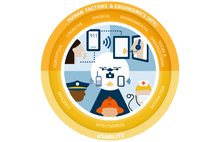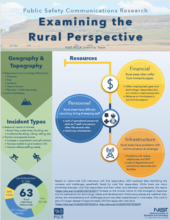User Interface/ User Experience Publications

Voices of First Responders: Discipline-specific NIST Special Publications
January 2023
Authors: NIST PSCR Usability Team: Shanée Dawkins, Yee-Yin Choong, Kerrianne Buchanan, Sandra Spickard-Prettyman
Communication Center & 9-1-1 Dispatch: https://doi.org/10.6028/NIST.SP.1286pt1
Emergency Medical Services: https://doi.org/10.6028/NIST.SP.1286pt2
Fire Service: https://doi.org/10.6028/NIST.SP.1286pt3
Law Enforcement: https://doi.org/10.6028/NIST.SP.1286pt4
Voices of First Responders: How to Facilitate Adoption and Usage of Communication Technology - An Integrated Analysis of Qualitative and Quantitative Findings
November 28, 2022
Citation: NIST Interagency/Internal Report (NISTIR) - 8443
Authors: Yee-Yin Choong, Kerrianne Buchanan, Shanee Dawkins, Sandra Spickard Prettyman
Voices of First Responders -- Nationwide Public Safety Communications Survey Findings: Statistical Analysis Results Phase 4, Volume 2
November 21, 2022
Citation: NIST Interagency/Internal Report (NISTIR) - 8444
Authors: Adam L. Pintar, Kerrianne Buchanan, Yee-Yin Choong

Augmented Reality (AR) Usability Evaluation Framework: The Case of Public Safety Communications Research
April 2022
Citation: NISTIR 8422
Authors: Yee-Yin Choong, Kurtis Goad, Kevin C. Mangold
Description: This report provides a five-component AR Usability Evaluation Framework to facilitate systematic planning of usability evaluations to ensure successful evaluations and collection of useful usability data for product improvement. The five components are: (1) Determine evaluation scope; (2) Identify users and context of use; (3) Develop evaluation scenario and tasks; (4) Select applicable usability metrics; and (5) Define usability measures for selected metrics. Following this framework to conduct usability evaluations throughout development cycle will help reduce development cost and bring the AR solutions to market faster, while providing usable products that are easy, quick, comfortable, and safe to use.

Voices of First Responders – Nationwide Public Safety Communication Survey Findings: Day-to-Day Technology, Phase 2, Volume 3
October 2021
This report is the 3rd in a series of reports on the data from a large-scale nationwide survey conducted by the NIST PSCR Usability Team. It follows NISTIR 8314, which focused on the forward-looking communication technology results from over 7,000 first responders in 9-1-1/Dispatch, Emergency Medical Services (EMS), Fire Service, and Law Enforcement who completed the survey. This report further presents survey findings, centered around first responders’ everyday use of communication technology and the problems they face.
PSCR Usability Results Tool: Voices of First Responders
September 2021
In order to understand the first responders, their experience, and their needs related to public safety communication technology, the NIST PSCR Usability Team conducted a multi-phase, exploratory sequential mixed methods study, including a series of in-depth interviews with approximately 200 first responders and a nationwide, large-scale survey completed by over 7,000 first responders in 9-1-1/Dispatch, Emergency Medical Services (EMS), Fire Service, and Law Enforcement. The results of these interviews informed a nationwide, large-scale survey completed by over 7,000 first responders. This tool provides public access to over 20,000 first responder quotes from the first responder interview data, as well as the 7,182 survey responses. This tool also provides a means to analyze the survey results, creating charts and tables dynamically based on filter selections. Any interview quotes or survey results used in published materials should properly attribute this tool as well as the appropriate NISTIR reports in the series of volumes published.

Voices of First Responders – Applying Human Factors & Ergonomics Knowledge to Improve the Usability of Public Safety Communications Technology, Findings from User-Centered Interviews, Phase 1, Volume 5
February 2021
Citation: NISTIR 8340
Authors: Yee-Yin Choong, Gavriel Salvendy
This report is the 5th in a series of reports on the data from the Phase 1 in-depth interviews. It is a companion document and should be used in conjunction with the Phase 1, Volume 2 report that identifies the technology problems and needs of first responders from the in-depth interview data. This report focuses on providing practical guidance and recommendations for improving the usability of communication technology for first responders by applying human factors and ergonomics principles and usability evaluation methodology.

Voices of First Responders – Nationwide Public Safety Communication Survey Findings: Mobile Devices, Applications, and Futuristic Technology, Phase 2, Volume 2
August 2020
Citation: NISTIR 8314
Authors: Shaneé Dawkins, Kristen K. Greene, Sandra Spickard Prettyman
The NIST PSCR Usability Team conducted a large-scale nationwide survey with over 7,000 first responders in 9-1-1/Dispatch, Emergency Medical Services (EMS), Fire Service, and Law Enforcement. Continuing a series of publications on the voices of first responders, this report details the forward-looking communication technology results from the nationwide survey data.
View an infographic summary of this report.
Voices of First Responders—Nationwide Public Safety Communication Survey Methodology: Development, Dissemination, and Demographics Phase 2, Volume 1
March 2020
Citation: NISTIR 8288
Authors: Kristen K. Greene, Shaneé Dawkins, Sandra Spickard Prettyman, Pamela Konkol, Mary F. Theofanos, Kevin Mangold, Susanne Furman, Yee-Yin Choong, Michelle P. Steves
Voices of First Responders – Examining Public Safety Communication from the Perspective of 9-1-1 Call Takers and Dispatchers Findings from User-Centered Interviews Phase 1, Volume 4
March 2020
Citation: NISTIR 8295
Authors: Michelle Steves, Mary F. Theofanos, Yee-Yin Choong, Shaneé Dawkins, Susanne Furman, Kristen K. Greene, Sandra Spickard Prettyman

November 2019
Citation: NISTIR 8277
Authors: Kristen K. Greene, Shaneé Dawkins, Mary F. Theofanos, Michelle Steves, Susanne Furman, Yee-Yin Choong, Sandra Spickard Prettyman
View a summary infographic of this report.
March 2019
Citation: NISTIR 8245
Authors: Shaneé Dawkins, Yee-Yin Choong, Kristen K. Greene, Susanne Furman, Michelle Steves, Mary F. Theofanos, Sandra Spickard Prettyman

July 2018
Citation: NISTIR 8216
Authors: Yee-Yin Choong, Shaneé Dawkins, Susanne Furman, Kristen K. Greene, Sandra Spickard Prettyman, Mary F. Theofanos
View a summary infographic of this report.

Public Safety User Interface R&D Summit Report
March 2018
Authors: Scott Ledgerwood, Marc Leh
Incident Scenarios Collection for Public Safety Communications Research
June 2017
Citation:NISTIR 8181
Usability Handbook for Public Safety Communications
May 2017
NIST Handbook 161
This handbook provides an overview of the user-centered design process and examples of how the process can be applied to the design and development of communications systems for the public safety community.
Public Safety User Interface R&D Roadmap
April 2017
Citiation: NISTTN 1961
The PSCR Public Safety Enhanced User Interface R&D Roadmap is the third of several technology roadmaps that PSCR has developed over the past several years to better inform the investment decisions of R&D organizations supporting the public safety community. This document aims to assist in planning for public safety communications research and optimize the allocation of the $300 million apportioned to NIST from the AWS-3 spectrum auction, which concluded in January 2015. This report intends to outline the current state of user interface technologies, forecast the evolution of user interface capabilities and gaps, and identify potential R&D opportunities that would improve public safety’s use of enhanced user interface technologies within operational settings. Upon completion of this roadmap, PSCR intends to identify R&D project ideas that pose the greatest operational benefit to public safety. These opportunities may be considered for inclusion in PSCR’s Innovation Accelerator program, drives R&D through prize challenges, grants, and/or cooperative agreements. Given the scope of technology under consideration and level of effort required to deliver enhanced user interface technologies to public safety, PSCR hopes that these findings and recommendations will educate stakeholders across all levels of government, industry, and academia.


